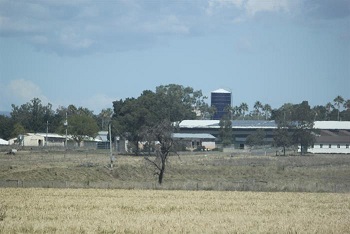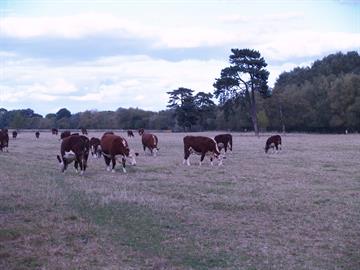Be an effective farm manager - learn the strategies and planning skills to manage a farm.

This valuable course will teach you about the management of of all farm resources, including:
- Production levels.
- Staff.
- Physical resources.
- Natural resources.
Study the essentials for managing a farm:
- Learn strategic planning.
- Understand the elements involved with whole farm planning.
- Learn how to prepare a business plan.
This course was developed by a team of experts with experience in countries, such as the UK, Australia and more, under the leadership of John Mason, a prolific writer and author of three Farm Management books (published by imprints of Simon & Schuster and CSIRO).
COURSE STRUCTURE AND CONTENT
 Course Duration: 100 hours.
Course Duration: 100 hours.
Start Date: Start at any time. Study at a pace that suits you, and with full tutor support whilst you are studying.
Qualification: Statement of Attainment.
Lessons: The course comprises 8 lessons.
Each lesson includes set tasks, and is completed with an assignment which you submit to your course tutor. The tutor will mark the assignment and return this to you with comments and sometimes offer suggestions for further reading or useful online resources.
Lesson 1. Strategic Planning
Planning procedures;the policy formulation approach, strategic management approach, initial strategy approach; Farm business structures; Management plans; Financial terminology and the money market; Finding finance; Rural finance sources; Financial terminology and record keeping; Contract law; Elements of a simple contract; Offers; Acceptance; Consideration; Strategic plans; Trusts.
Lesson 2. Business Plans
Farm Planning; Quality management systems; Whole farm planning; Preparing a business plan; Integrated production plans.
Lesson 3. Business Assessment
Business goals; factors involved in business assessment;Considering factors affecting your business; Drawing conclusions.
Lesson 4. Viability Analysis
Assessing profit; Risk analysis and managing risk; Standards; Cost efficiency; Cost of production; Quality and quantity standards; Financial records; The bookkeeping process; End of period accounting; Cash flow; Example of budget; sensitivity analysis.
Lesson 5. Management Strategies
Organising the workplace; Scheduling; Production systems; system variables; Animal production systems; Lot feeding; Cropping systems; Polyculture; Office systems; Computers;Business diversification; Value adding.
Lesson 6. Human Resources
Supervision; Organisational structures; Leadership; Workplace changes; Interviewing, recruitment and staff induction; Giving instructions; managing human resources; work scheduling; Occupational Health and safety; Duty of care; Protective equipment; Dealing with chemicals; Handling tools and equipment; Safety auditing.
Lesson 7. Physical Resources
Managing equipment, machinery and buildings; Managing physical resources;Engineering efficiency; Animal structures.
Lesson 8. Natural Resources
Regulations and legislation; Land Care programs; Rehabilitation; Trees; Erosion control; Soil degradation; Salinity; Soil acidification: Compaction; Chemical Residues; Water management; Water quality; Irrigation and watering systems.
Learning Aims
- Develop strategic planning methods for an agricultural business.
- Prepare a Farm Business Plan.
- Develop methods for assessing the operations of a Farm Business.
- Analyse the viability of different production enterprises: assessing profits, risk analysis, cost efficiency, quality standards, financial records.
- Develop strategies for managing different farm production enterprises, covering workplace organisation and crop scheduling.
- Plan the management of human resources in a farm business covering: supervision, types of leadership/managers, orders & instruction, motivating employees, and recruitment.
- Develop methods for managing the physical resources of a farm business including managing equipment, machinery and buildings.
- Develop methods for managing the natural resources of a farm business, covering topics: regulations & legislation, land care programs, erosion control, soil degradation, salinity, soil acidification, chemical residues, and compaction.
WHY CHOOSE ACS AS YOUR ONLINE PLACE TO LEARN?
- Quality - our courses are developed and tutored by experienced professionals, with real world experience.
- Relevant - our courses are relevant to today's world, with teaching that you can apply to real life situations.
- Independent - ACS were established in 1979 and are an independent distance learning school, meaning we remain fully focused on the development and teaching of our students.
- Flexible - our courses can be started at any time and studied at your own pace, and therefore fitted around your existing commitments.
- Choice - other than offering a wide range of courses in a multitude of disciplines, we provide the options of either online studies or eLearning - you choose the option which best suits you, so you can determine where and when you study.
SAMPLE COURSE NOTES - REDUCE RISK IN FARMING
Farms, as do all business ventures have associated risks involved. A major part of successful farm management is to foresee potential risks, and develop contingency plans to deal with them, if they do occur. Risk analysis involves identifying possible sources of risk and incorporating any consequences into the planning and management of the enterprise.
Risks come in many shapes and forms in the business of farming including the following:

Market risks (i.e. commodity price fluctuations. Selling prices fluctuate, exchange rate varies (important for export sales), terms of trade decline i.e. payments not made until months after sale, demand & supply vary).
-
Financial risks (i.e. fluctuating interest rates. Funds to operate the farm become tight creating liquidity problems, interest rates change, property values change (changing equity), production costs increase i.e. materials supplies go up).
-
Production risks (i.e. any factor that hampers production, such as disease or theft. Produce quality or quantity is affected by something i.e. weather, pests, disease, land degradation, the way in which livestock is managed - over grazing, effects of fertiliser use, pesticide damage, weeds, labour supply problems, harvesting difficulties).
-
Personal risks (i.e. health factors. Something goes wrong in the personal life of the farmer or employees i.e. health, family or social relationships, business succession - new generation taking control of family farm).
-
Management risks (i.e. technological applications. Making decisions based on incorrect or poor information, using less technology than the competition i.e. using more costly techniques to do the same job).
In order to minimise the impact of risk, the farm manager should be looking towards developing a risk management strategy. This should detail the areas identified as posing risk to the business.
Things which are, historically, of a risk nature can be factored into the total management plan. For example, drought in Australia is a relatively common occurrence. Nobody knows precisely when to expect drought yet records can provide statistical evidence to suggest that it is an obvious risk factor.
By compensating for this risk during drought free times, the impact of drought can be alleviated when it does occur.
This course is ideal if:
- You are too busy to attend a campus to study.
- You are in a remote or regional area and study options mean to you need to travel.
- You need flexibility to fit study around other seasonal activities associated with your busy work life.
- You want to improve and update your knowledge of farm management.
- You have been in the industry for a while but want increased confidence at management level.
- You are interested in working in farm management.
- You want to carry out some of internal business work yourself and reduce costs spent on outsourcing.
- You are applying for a new job or role in the industry and want to demonstrate commitment to professional development.
- You have a staff team or a particular person you want to up skill to take on more operational responsibilities
Any Questions?
Our Farm Management tutors are more than happy to answer any questions about the course.